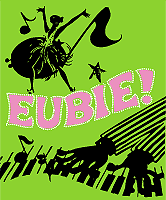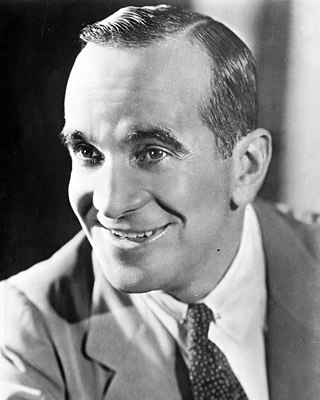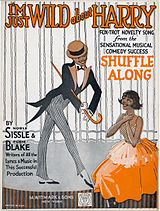
James Hubert "Eubie" Blake was an American pianist and composer of ragtime, jazz, and popular music. In 1921, he and his long-time collaborator Noble Sissle wrote Shuffle Along, one of the first Broadway musicals written and directed by African Americans. Blake's compositions included such hits as "Bandana Days", "Charleston Rag", "Love Will Find a Way", "Memories of You" and "I'm Just Wild About Harry". The 1978 Broadway musical Eubie! showcased his works, and in 1981, President Ronald Reagan awarded Blake the Presidential Medal of Freedom.
This is a list of notable events in music that took place in the year 1921.

Noble Lee Sissle was an American jazz composer, lyricist, bandleader, singer, and playwright, best known for the Broadway musical Shuffle Along (1921), and its hit song "I'm Just Wild About Harry".

Blue Monday was the original name of a one-act "jazz opera" by George Gershwin, renamed 135th Street during a later production. The English libretto was written by Buddy DeSylva. Though a short piece, with a running time of between twenty and thirty minutes, Blue Monday is often considered the blueprint to many of Gershwin's later works, and is often considered to be the "first piece of symphonic jazz" in that it was the first significant attempt to fuse forms of classical music such as opera with American popular music, with the opera largely influenced by Jazz and the African-American culture of Harlem.

Shuffle Along is a musical composed by Eubie Blake, with lyrics by Noble Sissle and a book written by the comedy duo Flournoy Miller and Aubrey Lyles. One of the most notable all-Black hit Broadway shows, it was a landmark in African-American musical theater, credited with inspiring the Harlem Renaissance of the 1920s and '30s.

African-American musical theater includes late 19th- and early 20th-century musical theater productions by African Americans in New York City and Chicago. Actors from troupes such as the Lafayette Players also crossed over into film. The Pekin Theatre in Chicago was a popular and influential venue.

Eubie! is a revue featuring the jazz and ragtime music of composer Eubie Blake, with lyrics by Noble Sissle, Andy Razaf, Johnny Brandon, F. E. Miller, and Jim Europe. The revue features no book, simply showcasing 23 of Eubie Blake's popular songs. The show was conceived by Julianne Boyd and opened in 1978, receiving positive reviews from Time, Newsweek, Variety, Backstage, and The Today Show.

Babes in Arms is the 1939 coming of age American film version of the 1937 Broadway musical of the same title. Directed by Busby Berkeley, it stars Mickey Rooney and Judy Garland, and features Charles Winninger, Guy Kibbee, June Preisser, Grace Hayes, and Betty Jaynes. It was Garland and Rooney's second film together as lead characters after their earlier successful pairing in the fourth of the Andy Hardy films. The film concerns a group of youngsters trying to put on a show to prove their vaudevillian parents wrong and make it to Broadway. The original Broadway script was significantly revamped, restructured, and rewritten to accommodate Hollywood's needs. Almost all of the Rodgers and Hart songs from the Broadway musical were discarded.
Harry MacGregor Woods was a Tin Pan Alley songwriter and pianist. He was a composer of numerous film scores.

Flournoy Eakin Miller, sometimes credited as F. E. Miller, was an American entertainer, actor, lyricist, producer and playwright. Between about 1905 and 1932 he formed a popular comic duo, Miller and Lyles, with Aubrey Lyles. Described as "an innovator who advanced black comedy and entertainment significantly," and as "one of the seminal figures in the development of African American musical theater on Broadway", he wrote many successful vaudeville and Broadway shows, including the influential Shuffle Along (1921), as well as working on several all-black movies between the 1930s and 1950s.

Aubrey Lee Lyles, sometimes credited as A. L. Lyles, was an American vaudeville performer, playwright, songwriter, and lyricist. He appeared with Flournoy E. Miller as Miller and Lyles as a popular African-American comedy duo from 1905 until shortly before his death. in 1929 they appeared on film as grocers in the Vitaphone Varieties short comedy film They Know Their Groceries.

Al Jolson was a Lithuanian-born American singer, actor, and vaudevillian.

A Dangerous Maid is a musical with a book by Charles William Bell, music by George Gershwin and lyrics by Ira Gershwin. The script is based on Bell's 1918 play A Dislocated Honeymoon. The story concerns an ex-showgirl who elopes with a society boy, but his family tries to break up the marriage. The Gershwins wrote ten songs for the musical, eight of which were used in the production, which premiered in Atlantic City, New Jersey, on March 21, 1921. It toured through several cities and ended in Pittsburgh, Pennsylvania, where it closed on April 16, 1921.

Is Everybody Happy? is an American black and white musical film released in 1943. The movie was in effect a biopic for Ted Lewis.
Felix Weir was an active African-American violinist during the early 20th century. He was a prominent performer, winning recognition for his virtuosity at a young age. He studied at the Chicago Musical College and the Conservatory at Leipzig, Germany.

Shuffle Along, or, the Making of the Musical Sensation of 1921 and All That Followed is a musical with a score by Eubie Blake and Noble Sissle and a libretto by George C. Wolfe, based on the original book of the 1921 musical revue Shuffle Along, by Flournoy Miller and Aubrey Lyles. The story focuses on the challenges of mounting the original production of Shuffle Along and its effect on Broadway and race relations.
Lottie Gee(néeCharlotte O. Gee; 17 August 1886 Millboro, Virginia – 13 January 1973 Los Angeles) was an American entertainer who performed in shows and musicals during the Harlem Renaissance. She is perhaps best known as a performer in the 1921 Broadway hit, Shuffle Along, the show that launched the careers of Josephine Baker and Florence Mills.
Gertrude C. Saunders was an American singer, actress and comedian, active from the 1910s to the 1940s.
Caroline “Lynnie” Godfrey is an American actress, singer, author, director and producer.












